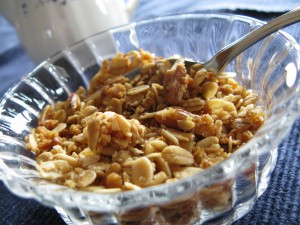I have been working on a research paper for my summer chemistry class. We were given the option to choose our topic, so I decided to pick something that I REALLY wanted to learn more about. I chose coocut oil! :)
The positive or negative effects of coconut oil is a hotly debated topic in the world of nutrition. Lots of people are for it and lots of people are against it. Our family uses coconut oil for a lot of things. Going into my research, I was pretty sure that it was healthy, but I didn’t know WHY. So I decided to clear up the confusion in my mind and research it as thoroughly as possible to understand its benifits (or its harms, if that were the case!).
Please note: I am not a doctor or a nutritionist. The following posts are soley the result of my research. Though I am convinced as to the validity of the following information, I’d encourage you to question my findings and, if you’re interested, do some research on your own.
“It’s SO saturated!” exclaimed a friend as I offered her a spoon with a lump of coconut oil to taste. She cautiously tasted only a bit of the soft white fat, unable to get over the fact that it solidified at room temperature. Isn’t that kind of like margarine? Isn’t it bad for you? Won’t it give me heart disease?! One of the most common misconceptions in the world of diets, weight loss, and the quest for optimal health is that fat is bad. Period. But that’s not the whole story. There are so many studies and information on different fats and how they affect the body, but today I will focus primarily on coconut oil. Most people have at least heard of coconut oil. This smooth white substance has been given a bad rap in the past, but numerous studies and research reveal otherwise.
To understand coconut oil, one must first have a good understanding of saturated vs. unsaturated fat. First of all, coconut oil is a saturated fat. Most people know saturated fats to be solid at room temperature. Examples of saturated fats are butter, lard, coconut oil, cream, hydrogenated oil, and chocolate. Saturated fats are generally viewed as artery-clogging enemies to your health. No exceptions.
But the truth is that saturated fats are not created equal. Let’s consider for a moment what a saturated fat actually is and the difference between a saturated and an unsaturated fat.
Unsaturated fats contain double bonds between the carbon atoms, causing bends or “kinks” in the shape of the molecules. Because some of the carbons share double bonds, they’re not bonded to as many hydrogens as possible, as in saturated fats. The kinks in the hydrogen tails prevent the molecules from packing together, making them liquid at room temperature.
On the flip side, the molecules that compose saturated fats are fully loaded with hydrogen atoms, forming straight chains between the fatty acids. Since these bonds contain the maximum possible amount of hydrogens, these would be called saturated fats. Because the bonds between fatty acids in saturated fats are fairly straight and packed closely together, they are typically solid at room temperature.
What is so bad about saturated fats and why are they harmful? The real fat culprits are man-made saturated fats, which are produced through a process called hydrogenation. These fats are chemically altered, created by injecting hydrogens into oil through pressure and extreme heat. The heat breaks the double bonds in unsaturated fats and artificially adds hydrogens to it. The result is a saturated fat, which stays solid at room temperature. This process is typically done to vegetable oils to make them more chemically stable. Look at the package labels of many processed foods, and any type of fat with the word “hydrogenated” before it is an example of these trans fats. Margarine is also a hydrogenated fat.
The reason that hydrogenated fats are so bad for your health is that the fats are exposed to very high temperatures during the process of hydrogenation, which creates trans fats. Trans fats are just about the worst thing you can eat because they are essentially toxic to the body. They are so harmful because they raise bad cholesterol (LDL) levels and lower good cholesterol (HDL) levels, which in turn clogs arteries and majorly increases the risk of heart disease. So the negative health effects generally associated with saturated fats come from trans fats, hydrogenated fats, man-made fats. They all mean the same thing. They contribute to the growing problem of obesity, heart disease, and the other diseases we attribute to fat. Why do manufacturers hydrogenate fats in the first place if they’re so detrimental to our health? Because it makes the fat more stable, gives it a longer shelf life, and gives food that yummy, greasy, rich texture we all crave in processed foods. Ugh. (Carter, 2011) Trans fats are found in all types of processed foods such as cookies, pastries, crackers, chips, and Cool Whip. As a side note, the fluffy, whipped texture of Cool Whip is derived primarily from hydrogenated vegetable oil, NOT from real cream. In fact, it’s listed as the second ingredient on the label!
What about naturally occurring saturated fats, though, such as coconut oil? Is that harmful too? No, as long as they’re not hydrogenated. Sure, some older studies have “proven” that coconut oil is bad for your heart, but those studies were done with hydrogenated coconut oil, so of course they got negative results! (Babcock, 2003) ANY fat that’s hydrogenated is bad for your health. But take coconut oil in its raw, natural form, and it is a gold mine of health. The reason for this has to do with the chain lengths of the fatty acids that compose coconut oil.
To be continued in part 2….
Sources:
Babcock, Michael. “The Truth About Coconut Oil.” Thai Food and Travel, 2003. Web. Accessed July 15, 2013 from [http://www.thaifoodandtravel.com/features/cocgood.html]
Carter, Janet. “Lipids: Fats, Oils, Waxes, etc.” Biology at Clermont College, March 2011. Web. Accessed July 10, 2013 from [http://biology.clc.uc.edu/courses/bio104/lipids.htm]




